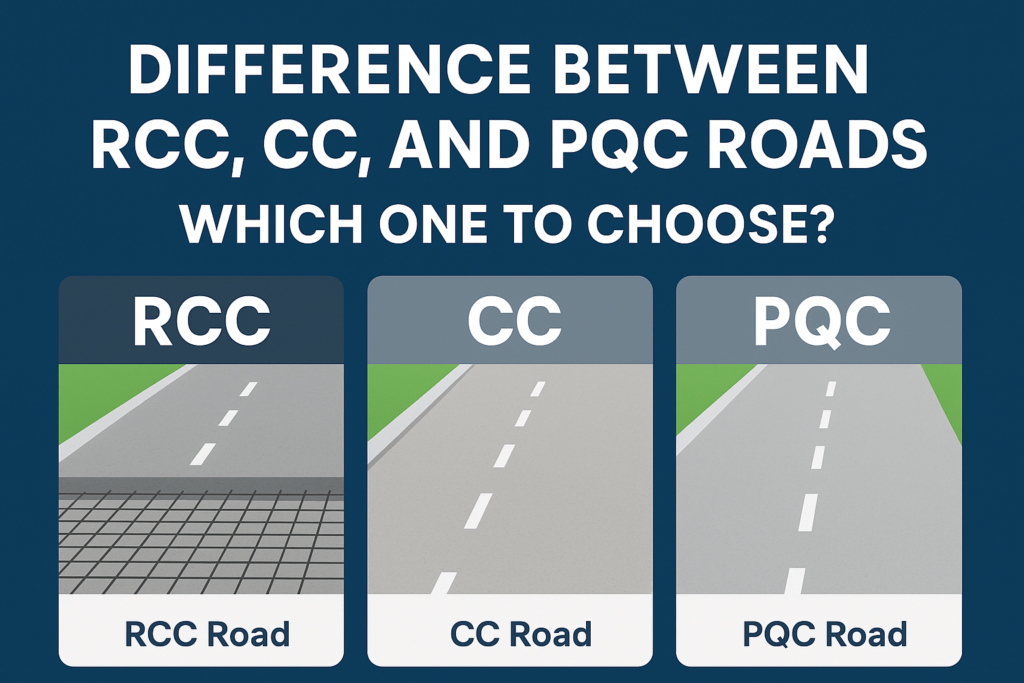Difference Between RCC, CC, and PQC Roads — Which One to Choose?

When it comes to durable and long-lasting road construction, terms like RCC, CC, and PQC often come up. Each of these road types serves a specific purpose depending on load requirements, traffic intensity, and maintenance needs. Understanding the differences between them is essential for engineers, contractors, and developers to make the right decision for their projects.
In this blog, we’ll explain what RCC, CC, and PQC roads are, their construction methods, benefits, and how to choose the right one for your site.
1. What Is an RCC Road?
RCC stands for Reinforced Cement Concrete. It’s one of the most widely used road types in India, known for its strength, durability, and low maintenance.
Composition:
RCC roads are made by mixing cement, sand, aggregates, and water, reinforced with steel bars or mesh to improve tensile strength.
Construction Process:
- Subgrade preparation and compaction.
- Laying a base course (WBM or granular sub-base).
- Placing reinforcement (steel mesh or rebars).
- Pouring concrete mix and compacting with vibrators.
- Finishing and curing for around 28 days.
Key Features:
- High load-bearing capacity.
- Long lifespan (20–30 years).
- Less prone to deformation compared to flexible pavements (bitumen roads).
- Minimal maintenance over time.
Applications:
- Heavy traffic urban roads.
- Industrial areas and factory internal roads.
- Bus depots and logistics yards.
Limitations:
- Initial cost is higher than asphalt roads.
- Construction takes longer due to curing time.
- Joints must be properly designed to prevent cracks.
2. What Is a CC Road?
CC stands for Cement Concrete road. Technically, RCC is also a type of CC road, but the difference lies in reinforcement. A CC road is generally plain concrete without steel reinforcement, making it suitable for lighter traffic or smaller infrastructure.
Composition:
A simple mix of cement, sand, and coarse aggregates. No reinforcement bars are used unless required for small patches.
Construction Process:
- Preparing the subgrade.
- Laying concrete directly over the surface.
- Leveling and finishing using screed boards.
- Curing for proper strength development.
Key Features:
- Simple and cost-effective.
- Smooth surface and easy to clean.
- Quick to construct compared to RCC roads.
Applications:
- Rural and village roads.
- Parking lots, residential streets, and pathways.
- Temporary construction routes.
Limitations:
- Less tensile strength due to absence of steel reinforcement.
- Cracks may appear if expansion joints are not provided.
- Not ideal for high-traffic or heavy-load areas.
3. What Is a PQC Road?
PQC stands for Pavement Quality Concrete. This is the highest grade of concrete road, primarily used for expressways, highways, airport runways, and industrial pavements. It’s designed to withstand heavy loads, continuous traffic, and extreme weather conditions.
Composition:
PQC uses high-quality materials with low water-cement ratio, often including superplasticizers, fiber reinforcement, and air-entraining agents for durability. The concrete grade is usually M40 or higher.
Construction Process:
- Subgrade and DLC (Dry Lean Concrete) preparation.
- Formwork setup or slip-form paving.
- Pouring and compacting PQC with vibrators or laser screed.
- Finishing and texture brooming for skid resistance.
- Curing for 14–28 days.
Key Features:
- Excellent strength and surface finish.
- Can withstand heavy wheel loads.
- Long-term performance (life span of 30–40 years).
- Low maintenance and high resistance to weathering.
Applications:
- National highways, expressways, and airport pavements.
- Heavy-duty industrial roads.
- Ports and container terminals.
Limitations:
- Expensive initial investment.
- Requires skilled labor and quality control.
- Construction time can be longer due to strict quality requirements.
4. Comparison Table: RCC vs CC vs PQC Roads
| Feature | RCC Road | CC Road | PQC Road |
|---|---|---|---|
| Full Form | Reinforced Cement Concrete | Cement Concrete | Pavement Quality Concrete |
| Reinforcement | Yes (Steel Bars/Mesh) | No | Optional (fibers / dowel bars) |
| Concrete Grade | M30 – M35 | M20 – M25 | M40 and above |
| Load Capacity | High | Medium | Very High |
| Durability | 20–30 years | 10–15 years | 30–40 years |
| Cost | Moderate | Low | High |
| Curing Time | 28 days | 21 days | 28 days |
| Best Use Case | Industrial / City Roads | Rural / Local Roads | Highways / Airports / Heavy-Load Areas |
5. Which Road Type Should You Choose?
The right choice depends on several factors — traffic load, budget, environment, and project lifespan.
- Choose CC Road if you’re building low-traffic village roads, internal colony roads, or temporary paths. It’s the most budget-friendly option.
- Choose RCC Road if you need a durable, long-lasting surface for industrial zones, municipal roads, or heavy vehicle areas. It’s a perfect balance between strength and cost.
- Choose PQC Road for highways, airports, ports, or logistics hubs where performance and durability are top priorities.
If your project demands precision leveling, strength, and durability, PQC or RCC roads are the best options. For smaller projects or low-budget works, CC roads offer good value.
6. Final Thoughts
Each road type — RCC, CC, and PQC — plays a crucial role in India’s infrastructure landscape. The right selection can drastically reduce maintenance costs and increase the life span of your project.
At Nitisha Ventures, we specialize in industrial flooring, RCC and PQC road construction, and laser-screed concrete flooring across India. With expert engineering and advanced technology, we ensure every project meets international standards of quality and durability.